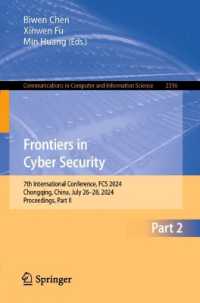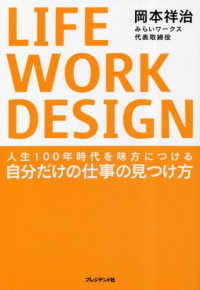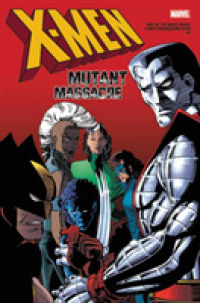- ホーム
- > 洋書
- > ドイツ書
- > Social Sciences, Jurisprudence & Economy
- > Education Science / Pedagogic
- > public education (school & university)
Full Description
This textbook evolves from the intersection between 'Research', 'Educational Information Technologies' and recent 'Best Practices'. It offers diplomacy and erudite rhetoric in order to harvest from innovation projects and see how new professional needs for teachers are emerging day by day. The volume launches the compact background for the 21st century education that every teacher faces after being in charge for 3 or 6 years after pre-service training. 'Sources for a better education' refers to the deep understanding and to the incentives for encouraging teachers to leave the comfort zone and experiment the next steps into a further sophisticated professionalism, without the threat of feeling in a 'Dilemma'.
The first candidate for extending one's teaching effectiveness is to tailor one's teaching to the test to be expected. 'Teaching to the Test' is an understandable tactic, however it endangers the students' full understanding of underlying concepts and analogies. The second candidate for professionalism is the deeper layer of knowledge on how curricular domains are related. In simpler terms: better teachers know how to 'bridge' topics and subjects so that students develop a deeper understanding on the patterns and structure in knowledge. The 21st century education prioritizes higher degrees of flexible-, divergent and abstract thinking, so that creative problem solving comes into reach. ICT tools for making prior knowledge explicit is a major example on how learners harvest upon prior knowledge, thinking and intuition. The third source for a better education is the courage to envisage one's meta knowledge in order to see patterns in learning and understanding. The more conscious prior knowledge gets decompiled into genetic metaphors; the better future learning can be anticipated. The fourth asset for meta-cognitive skills is the wide spectrum of tools that the web offers for building knowledge infra-structures so that knowledge becomes transformed into problem solving skills; the availability of knowledge is no longer sufficient for finding creative and authentic solutions in future situations. This is the case for both students and teachers. By tradition, the bottom-up strategy from reproductive factual learning up to the levels of problem solving and creative thinking has been favoured. The 'one-click away' access to information on the web asks a more strategic attitude from learners and practitioners to cope with the periphery between known and unknown, so that a more effective meta-cognition develops. The fifth stimulus for more effective learning is the expanding impact of social media. Social media tend to intimidate learners with incomplete understanding to jump on biases as delivered through political and conspiracy agendas. This books aims at the challenge to build upon learners' existential needs and developing interest for a longer-term learning perspective.
"Renaissance man and philosopher Piet Kommers presentsus with an interesting question: What makes education exciting? His book covers a range of lessons learnt through research and practice, covering philosophies and paradoxes, ranging from learning to learn to machine learning for learning. In 35 chapters he takes us on an exciting, comprehensive journey of just about every conceivable aspect of technology and education. This is a must-have for every 21st Century bookshelf!" By: Johannes Cronjé, professor of Digital Teaching and Learning in the Department of Information Technology at the Cape Peninsula University of Technology, South Africa.
"Piet Kommers has in 400 pages provided an overview of teaching based on practical experience. It is not a summary of pedagogic models, but a guide to important factors in how to motivate students and thus improve their learning. New technologies changes teaching, and we need to understand how application of such technologies can improve the learning. This book provides such knowledge and I wish I had it when I started teaching at university many years ago." By: Jan Frick, Professor Business School, University of Stavanger, Norway.
"Piet Kommers delivers a very thorough book with a holistic perspective on Learning Technologies. This book is a result of many years of experience that the author has in Higher Education. It comprises lessons learned from the author's professional career, including inputs from European Union research projects, as well as diversified interactions with a wide range of Peoples and Cultures. The result is a unique perspective that is a must-read for anyone interested in Learning Technologies, past, present, and future!" By: Pedro Isaias, associate professor at the Information Systems & Technology Management School of The University of New South Wales (UNSW - Sydney), Australia.
"Distinguished Professor and Thinker Dr. Piet Kommers presents the academic community with a new horizon on education that reflects thecurrent and future technology trends in the e-Learning and Fast Internet ubiquity. The Book discusses the current and most recent advances in research and application of most effective learning methods in conjunction with the future directions in machine learning in support of learning. The Book's 35 chapters present cutting-edge technologies and state-of-the-art learning methods in support of best educational practices and the student's best learning experience. The Book is most valuable asset to educator's community pursuing the mission of excellence in the Third Millennium!" By: Eduard Babulak, Professor, Computational Sciences, Liberty University, Lynchburg, USA.
"Well-known scientist, (e-)learning expert and philosopher Piet Kommers presents us with an interesting question: What makes education exciting? His book covers a range of lessons learnt through research and practice, covering philosophies and paradoxes, ranging from 'learning to learn' to 'machine learning for learning'. In 35 chapters he takes us on an exciting, comprehensive journey of just about every conceivable aspect of technology and education. This is an interesting and useful publication for all educators as well as learners and must-have for every 21st Century bookshelf!" By: Eugenia Smyrnova-Trybulska, Dr. hab., associate professor, Institute of Pedagogy, Faculty of Art and Sciences of Education, University of Silesia in Katowice, Poland.
"The book presents a mosaic of assets reflecting the vast international experience in research and realization of learning technologies of the author, honourable professor of the UNESCO Chair in New information technologies in education for all, Piet Kommers. Describing various aspects of learning strategies, approaches, techniques and technologies in a concise way, he engages the readers into the mental construction of a "big picture" and makes them reconsider routine processes of teaching and learning. Exciting and thought-provoking reading for educators, researchers, and devoted learners." By: professor Volodymyr Gritsenko, Director of the International Research and Training Centre for Information Technologies and Systems, National Academy of Sciences and Ministry of Education and Science of Ukraine, Head of the UNESCO Chair.
Contents
1. Tempting paradoxes.- 2. Learning: A Diverse process.- 3. Philosophical Pillars.- 4. Nature and Culture.- 5. Smart Education.- 6. The entrance of Technology.- 7. Cognitive Learning Tools.- 8. Concept Mapping.- 9. Mapping and Memory Load.- 10. Conceptual Entailments.- 11. Navigation in Hypertext.- 12. Mapping for Hypertext.- 13. Conceptual Awareness.- 14. Explicit Representations.- 15. Trailectics for conscience.- 16. Learning, playing, working.- 17. Media as Catalyst.- 18. The Information Age.- 19. ICT in Secondary Education.- 20. Twenty-First Century.- 21. The Use of Web Tools.- 22. Teacher Training.- 23. Searching for Search Engines.- 24. Visual Imagination.- 25. Virtual Reality for Learning.- 26. Virtual Surgical Training.- 27. Educational Design.- 28. Vocational Education.- 29. Construals.- 30. Open Educational Resources.- 31. Steam During Covid-19.- 32. Programming Skills.- 33. Communities of Practice.- 34. Professional Development.- 35. International Exchange.







